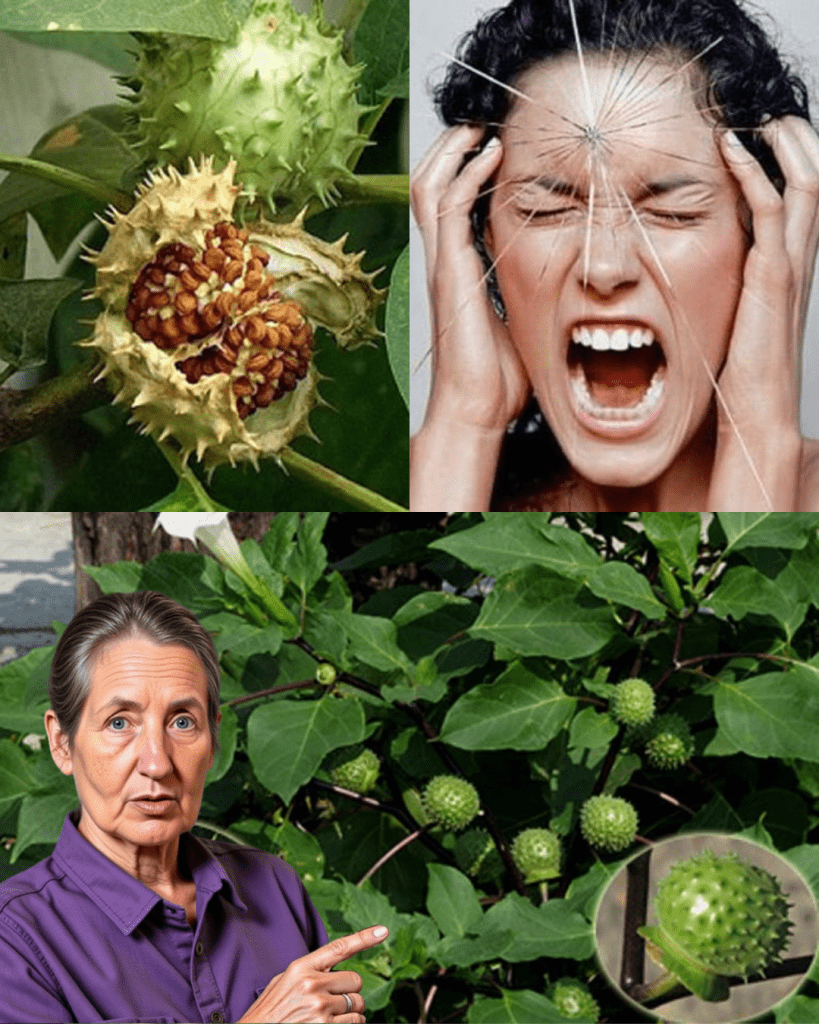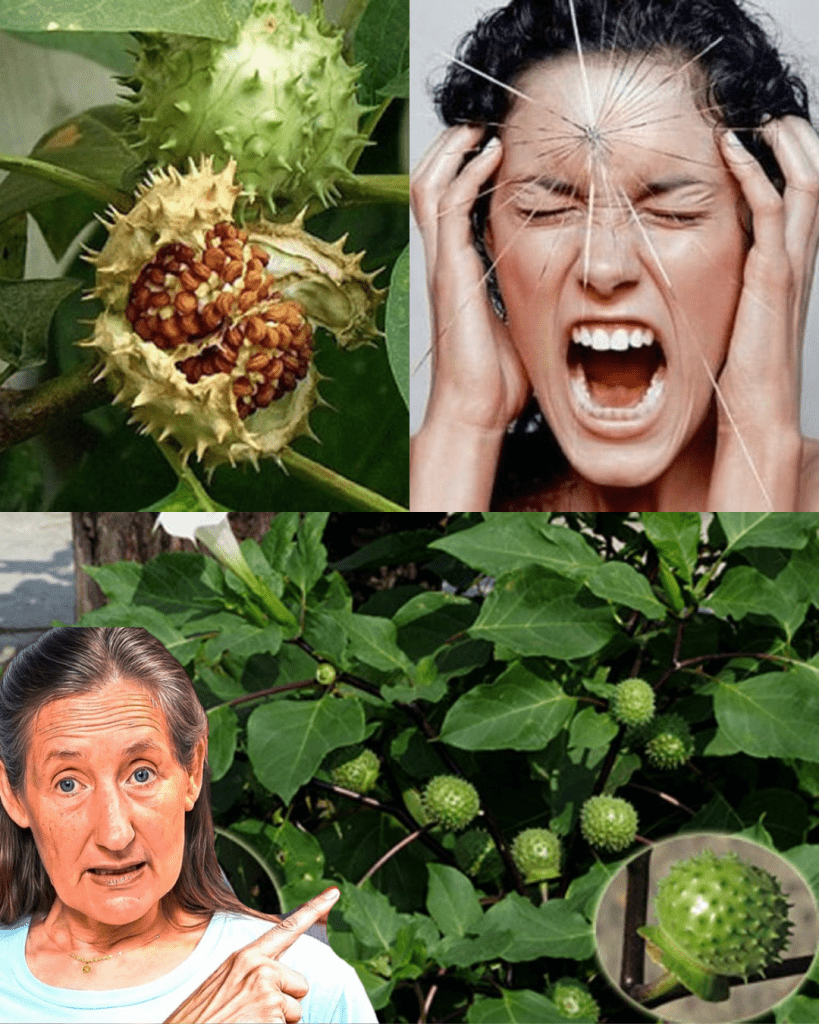Have you ever stumbled across a plant so stunning it stops you in your tracks? Datura stramonium, with its elegant trumpet-shaped flowers and spiky seed pods, might seem like a gardener’s dream. But beneath its alluring exterior lies a deadly secret that could turn your peaceful hobby into a nightmare. For seniors and outdoor enthusiasts, the risks are even higher. This plant, found across North America, is one of the most toxic in existence, and a single mistake could lead to severe health consequences. Let’s uncover the truth about Datura stramonium and learn how to stay safe while enjoying your time in nature.

Why Datura Stramonium Is So Deceptive
Datura stramonium, often called jimsonweed or devil’s trumpet, grows wild in gardens, fields, and even along roadsides. Its large, white or purple flowers and unique seed pods make it look like a decorative plant you’d proudly display. For seniors who cherish gardening or foraging, its beauty can be dangerously tempting.
But appearances are misleading. Every part of this plant—leaves, flowers, seeds, and roots—is packed with toxic compounds that can cause severe harm. Unlike edible nightshade relatives like tomatoes, Datura’s potency is unpredictable, varying with soil, climate, and other factors. This makes it impossible to gauge a “safe” level of exposure, putting everyone, especially older adults, at risk.
The Toxic Powerhouse: What Makes Datura Deadly
The danger lies in Datura stramonium’s high levels of tropane alkaloids, including atropine, scopolamine, and hyoscyamine. These chemicals disrupt the nervous system by blocking acetylcholine, a critical neurotransmitter. For seniors with heart conditions or those on medications, even minimal contact—like brushing against the plant—can trigger serious reactions.
According to the National Institutes of Health, these toxins can cause symptoms ranging from mild discomfort to life-threatening emergencies. Accidental exposure, such as touching the plant and then your eyes or mouth, can lead to rapid absorption of these dangerous compounds. Understanding this risk is the first step to staying safe.
Recognizing the Symptoms of Datura Poisoning
Knowing the signs of Datura stramonium poisoning could save a life, especially for seniors who spend time outdoors. Symptoms typically appear within 30 to 60 minutes of exposure and may persist for up to 48 hours. Here’s what to watch for:
- Dry mouth and extreme thirst: The plant’s anticholinergic effects reduce saliva, leaving you parched.
- Dilated pupils and blurred vision: This can impair focus and increase light sensitivity.
- Rapid heartbeat: A major concern for those with cardiovascular issues.
- Hallucinations and delirium: These can cause confusion, agitation, or fear.
- Seizures or coma: In severe cases, immediate medical intervention is critical.
If you suspect exposure, act fast. Recognizing these symptoms early can make all the difference.
How You Might Encounter Datura Stramonium
This plant is more common than you might think, thriving in backyards, parks, and rural areas across the U.S. Seniors, in particular, may cross paths with it in several ways:
- Gardening accidents: Datura can sprout unexpectedly among other plants.
- Foraging errors: Mistaking it for an edible herb is a dangerous possibility.
- Skin contact: Touching the plant without gloves can lead to toxin absorption.
- Pet or child exposure: Curious pets or grandchildren may ingest it, posing risks to the whole family.
A case study in the International Journal of Emergency Medicine highlighted a child who suffered severe poisoning after eating Datura seeds. Seniors, with slower metabolisms and potential health issues, face similar dangers, making awareness crucial.
Step-by-Step Guide to Staying Safe from Datura Stramonium ✅
Protecting yourself from Datura stramonium doesn’t mean giving up your love for gardening or nature. Follow this practical process to minimize risks while enjoying the outdoors:
- Identify the plant: Look for trumpet-shaped flowers, spiky seed pods, and jagged leaves. Use a plant identification app or consult a local gardening expert.
- Wear protective gear: Always use gloves, long sleeves, and tools when working in areas where Datura might grow.
- Supervise vulnerable family members: Keep pets and children away from unknown plants.
- Avoid foraging unknowns: Stick to verified, store-bought herbs to eliminate the risk of misidentification.
- Remove Datura safely: If you spot it, use gloves and tools to dig it out. Double-bag the plant and dispose of it in the trash—never burn it, as the smoke is toxic.
By following these steps, you can enjoy your garden with peace of mind, knowing you’re protected from this hidden danger.

What to Do if Poisoning Occurs
If you or someone else comes into contact with Datura stramonium, quick action is essential. The Mayo Clinic outlines these critical steps:
- Call for help immediately: Contact 911 or Poison Control at 1-800-222-1222. Provide details about the plant and symptoms.
- Avoid inducing vomiting: This can worsen the situation, especially for seniors with health conditions.
- Seek medical attention: Treatments like activated charcoal or physostigmine may be needed, but only a doctor can administer them.
- Bring a sample if safe: A piece of the plant can help medical professionals identify the toxin faster.
Acting swiftly can prevent serious complications and ensure the best possible outcome.
Safe Gardening Alternatives for Seniors 🌱
Gardening is a fantastic way for seniors to stay active, reduce stress, and connect with nature. To keep it safe and enjoyable, focus on non-toxic plants like marigolds, sunflowers, or lavender. These vibrant options bring beauty to your garden without the risks.
Joining a local gardening club can also provide valuable insights. Fellow gardeners can share tips on safe plants and help you identify potential hazards. By making informed choices, you can cultivate a thriving, worry-free garden.
Conclusion: Stay Informed, Stay Safe
Datura stramonium’s beauty is a dangerous illusion. Its toxic compounds pose a serious threat, especially to seniors who love gardening or exploring the outdoors. By learning to identify this plant, taking simple precautions, and knowing how to respond to exposure, you can protect yourself and your loved ones.
Don’t let this deceptive plant ruin your passion for nature. Embrace safe gardening practices, choose non-toxic plants, and keep enjoying the physical and mental benefits of time spent outdoors. With a little knowledge, you can stay safe and make every moment in your garden a joy.









